综合英语教程第三册11单元3-11-Part 3
全新版大学英语综合教程3各单元summary课本原文及翻译
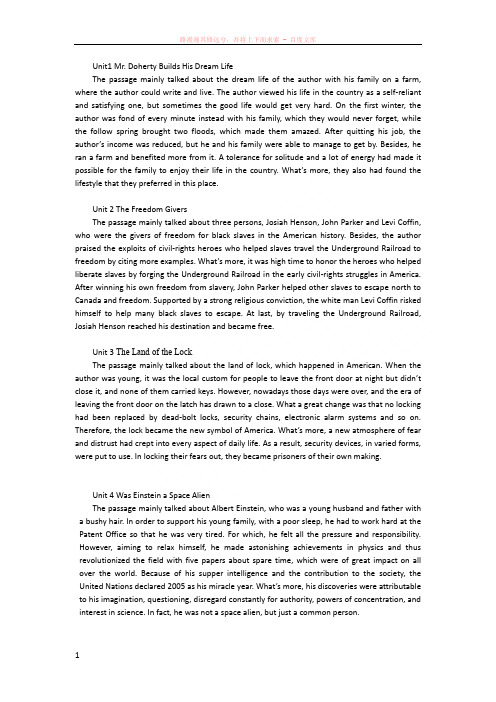
Unit1 Mr. Doherty Builds His Dream LifeThe passage mainly talked about the dream life of the author with his family on a farm, where the author could write and live. The author viewed his life in the country as a self-reliant and satisfying one, but sometimes the good life would get very hard. On the first winter, the author was fond of every minute instead with his family, which they would never forget, while the follow spring brought two floods, which made them amazed. After quitting his job, the author’s income was reduced, but he and his family were able to manage to get by. Besides, he ran a farm and benefited more from it. A tolerance for solitude and a lot of energy had made it possible for the family to enjoy their life in the country. What’s more, they also had found the lifestyle that they preferred in this place.Unit 2 The Freedom GiversThe passage mainly talked about three persons, Josiah Henson, John Parker and Levi Coffin, who were the givers of freedom for black slaves in the American history. Besides, the author praised the exploits of civil-rights heroes who helped slaves travel the Underground Railroad to freedom by citing more examples. What’s more, it was high time to honor the heroes who helped liberate slaves by forging the Underground Railroad in the early civil-rights struggles in America. After winning his own freedom from slavery, John Parker helped other slaves to escape north to Canada and freedom. Supported by a strong religious conviction, the white man Levi Coffin risked himself to help many black slaves to escape. At last, by traveling the Underground Railroad, Josiah Henson reached his destination and became free.Unit 3 The Land of the LockThe passage mainly talked about the land of lock, which happened in American. When the author was young, it was the local custom for people to leave the front door at night but didn’t close it, and none of them carried keys. However, nowadays those days were over, and the era of leaving the front door on the latch has drawn to a close. What a great change was that no locking had been replaced by dead-bolt locks, security chains, electronic alarm systems and so on. Therefore, the lock became the new symbol of America. What’s more, a new atmosphere of fear and distrust had crept into every aspect of daily life. As a result, security devices, in varied forms, were put to use. In locking their fears out, they became prisoners of their own making.Unit 4 Was Einstein a Space AlienThe passage mainly talked about Albert Einstein, who was a young husband and father with a bushy hair. In order to support his young family, with a poor sleep, he had to work hard at the Patent Office so that he was very tired. For which, he felt all the pressure and responsibility. However, aiming to relax himself, he made astonishing achievements in physics and thus revolutionized the field with five papers about spare time, which were of great impact on all over the world. Because of his supper intelligence and the contribution to the society, the United Nations declared 2005 as his miracle year. What’s more, his discoveries were attributable to his imagination, questioning, disregard constantly for authority, powers of concentration, and interest in science. In fact, he was not a space alien, but just a common person.Unit 5 Three Thank-You LettersThe passage mainly talked about the author’s three special letters, by which he wanted to celebrate the true meaning of Thanksgiving. On Thanksgiving Day 1943, as a young coastguardsman at sea, he worked as a cook. While he was going to think about Thanksgiving, he came up with the idea of expressing his gratitude to people who had helped him before. Therefore, he wrote three thank-you letters to three persons, his father, the Rev. Nelson and his grandmother. At a mail call, he got three letters in reply, which drove him to think deeply. After he retired from the Coast Guard, he still never forgot these letters which gave him an insight into expressing appreciation for one’s efforts. Furthermore, he wished everyone to find the good and then praise it.Unit 6 The Last LeafThe passage mainly talked about the last leaf, which Johnsy gave a sight to after she got the pneumonia and lived in the hospital. She looked out the window and counted the leaves on an old ivy vine. Furthermore, she made up her mind to end her life when the last leaf fell. When she saw the last leaf still cling to the vine after two nights’ rain and wind, she decided not to give up her life. In fact, the last leaf, called a masterpiece by Behrman who risked his life painting it there the night that the last leaf fell, was actually painted onto the wall. However, because it looked so real that she could have never imagined that it was faked. In a deeper sense, it saved her life.unit 1 Mr. Doherty Builds His Dream LifeIn America many people have a romantic idea of life in the countryside. Many living in towns dream of starting up their own farm, of living off the land. Few get round to putting their dreams into practice. This is perhaps just as well, as the life of a farmer is far from easy, as Jim Doherty discovered when he set out to combine being a writer with running a farm. Nevertheless, as he explains, he has no regrets and remains enthusiastic about his decision to change his way of life.在美国,不少人对乡村生活怀有浪漫的情感。
综合英语3Unit11

Audiovisual Supplement
Cultural Information
Audiovisual Supplement
Cultural Information
Miss Johnson: Well, if you all feel that strongly about it, leave the room. Student A: What? Miss Johnson: Hey, listen! Nobody’s forcing you to be here. You have a choice. You can stay, or you can leave. Student B: Lady, why are you playing this game? We don’t have a choice. Miss Johnson: You don’t have a choice? You don’t have a choice on whether or not you’re here? Student B: No! If we leave, we don’t get to graduate. If we stay, we gotta put up with you. Miss Johnson: That’s a choice, isn’t it? You have a choice. You either don’t graduate or you have to put up with me. It may not be a choice you like, but it is a choice.
Audiovisual Supplement
Cultural Information
大学英语专业综合教程第三册Unit11课文及单词
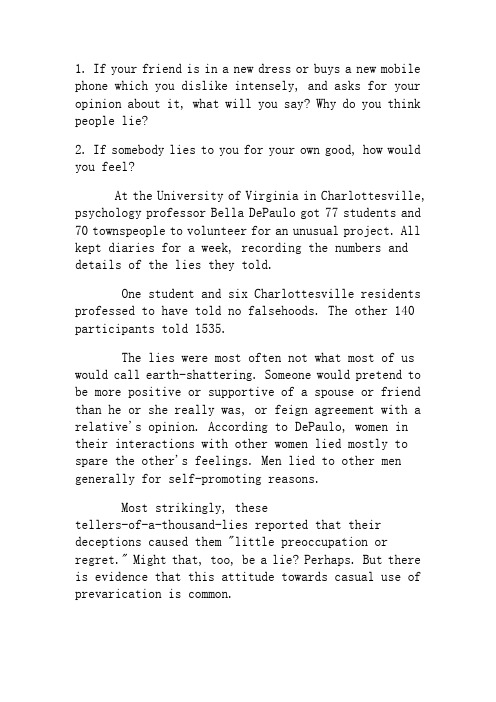
1. If your friend is in a new dress or buys a new mobile phone which you dislike intensely, and asks for your opinion about it, what will you say? Why do you think people lie?2. If somebody lies to you for your own good, how would you feel?At the University of Virginia in Charlottesville, psychology professor Bella DePaulo got 77 students and 70 townspeople to volunteer for an unusual project. All kept diaries for a week, recording the numbers and details of the lies they told.One student and six Charlottesville residents professed to have told no falsehoods. The other 140 participants told 1535.The lies were most often not what most of us would call earth-shattering. Someone would pretend to be more positive or supportive of a spouse or friend than he or she really was, or feign agreement with a relative's opinion. According to DePaulo, women in their interactions with other women lied mostly to spare the other's feelings. Men lied to other men generally for self-promoting reasons.Most strikingly, these tellers-of-a-thousand-lies reported that their deceptions caused them "little preoccupation or regret." Might that, too, be a lie? Perhaps. But there is evidence that this attitude towards casual use of prevarication is common.For example, 20,000 middle-and high-schoolers were surveyed by the Josephson Institute of Ethics — anonprofit organization in Marina del Rey, California, devoted to character education. Ninety-two per cent of the teenagers admitted having lied to their parents in the previous year, and 73 per cent characterized themselves as "serial liars," meaning they told lies weekly. Despite these admissions, 91 per cent of all respondents said they were "satisfied with my own ethics and character."Think how often we hear the expressions "I'll call you" or "The check is in the mail" or "I'm sorry, but he stepped out." And then there are professions —lawyers, pundits, public relations consultants —whose members seem to specialize in shaping or spinning the truth to suit clients' needs.Little white lies have become ubiquitous, and the reasons we give each other for telling fibs are familiar. Consider, for example, a corporate executive whom I'll call Tom. He goes with his wife and son to his mother-in-law's home for a holiday dinner every year. Tom dislikes her "special" pumpkin pie intensely. Invariably he tells her how wonderful it is, to avoid hurting her feelings."What's wrong with that?" Tom asked Michael Josephson, president of the Josephson Institute. It's a question we might all ask.Josephson replied by asking Tom to consider the lie from his mother-in-law's point of view. Suppose that one day Tom's child blurts out the truth, and she discovers the deceit. Will she tell her son-in-law, "Thank you for caring so much"? Or is she more likelyto feel hurt and say, "How could you have misled me all these years? And what else have you lied to me about?"And what might Tom's mother-in-law now suspect about her own daughter? And will Tom's boy lie to his parents and yet be satisfied with his own character?How often do we compliment people on how well they look, or express our appreciation for gifts, when we don't really mean it? Surely, these "nice lies" are harmless and well-intended, a necessary social lubricant. But, like Tom, we should remember the words of English novelist Sir Walter Scott, who wrote, "What a tangled web we weave, when first we practice to deceive."Even seemingly harmless falsehoods can have unforeseen consequences. Philosopher Sissela Bok warns us that they can put us on a slippery slope. "After the first lies, others can come more easily," she wrote in her book Lying: Moral Choice in Public and Private Life. "Psychological barriers wear down; the ability to make more distinctions can coarsen; the liar's perception of his chances of being caught may warp."Take the pumpkin-pie lies. In the first place, it wasn't just that he wanted his mother-in-law to feel good. Whether he realized it or not, he really wanted her to think highly of him. And after the initial deceit he needed to tell more lies to cover up the first one.Who believes it anymore when they're told that the person they want to reach by phone is "in a meeting"? By itself, that kind of lie is of no great consequence.Still, the endless proliferation of these little prevarications does matter.Once they've become common enough, even the small untruths that are not meant to hurt encourage a certain cynicism and loss of trust. "When [trust] is damaged," warns Bok, "the community as a whole suffers; and when it is destroyed, societies falter and collapse."Are all white lies to be avoided at all costs? Not necessarily. The most understandable and forgivable lies are an exchange of what ethicists refer to as the principle of trust for the principle of caring, "like telling children about the tooth fairy, or deceiving someone to set them up for a surprise party," Josephson says. "Still, we must ask ourselves if we are willing to give our friends and associates the authority to lie to us whenever they think it is for our own good."Josephson suggests a simple test. If someone you lie to finds out the truth, will he thank you for caring? Or will he feel his long-term trust in you has been undermined?And if you're not sure, Mark Twain has given us a good rule of thumb. "When in doubt, tell the truth. It will confound your enemies and astound your friends."New words:volunteerv. to give or offer (one's help, a suggestion, etc.) willingly or without being paidprofessv. to make a claimfeignv. to pretend to have or bepreoccupationn. the state of constantly thinking or worrying about somethingprevaricationn. the state of avoiding giving a direct answer or making a firm decisionseriala. of, in or forming a number of things, events, etc. of a similar kind, especially placed or occurring one after anotherethicsn. moral correctness; moral principlespunditn. a person who is an authority on a particular subject; an expertconsultantn. a person who gives specialist professional advice to othersfibn. a small unimportant liedeceitn. dishonest act or statementlubricantn. a substance such as oil which cause a machine to operate more easilytanglev. to make or become a mass of disordered and twisted threadswear downto reduce or become weaker until uselessperceptionn. the ability to see, hear and understand; the quality of understandingwarpv. to (cause to) turn or twist out of shapeproliferationn. a rapid increase in the amount or number of somethingcynicismn. the belief that people always act selfishlyfalterv. to lose power or strength in an uneven way, thus no longer making much progressassociaten. a person who is connected to another person as a businesspartner, colleague, or companionunderminev. to gradually make somebody or something less strong or effectiveconfoundv. to confuse and greatly surprise people, causing them to be unable to explain or deal with a situationastoundv. to make somebody very surprised or shocked, especially with (news of) something completely unexpected。
何兆熊《综合教程(3)》(第2版)学习指南-Unit 11【圣才出品】
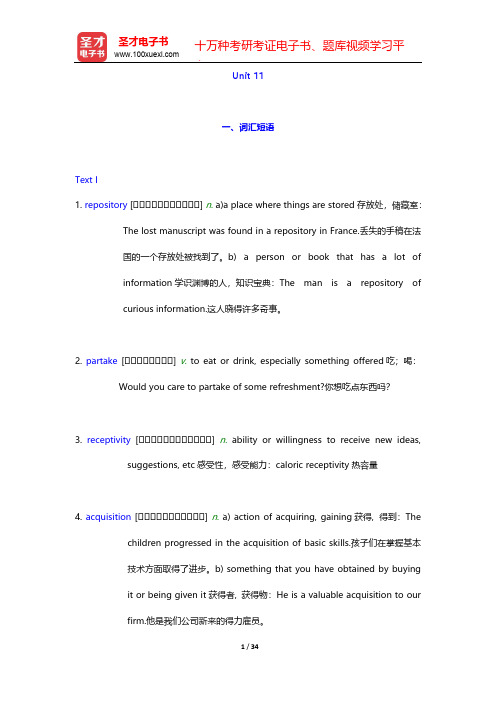
Unit 11一、词汇短语Text I1. repository [ ] n. a)a place where things are stored存放处,储藏室:The lost manuscript was found in a repository in France.丢失的手稿在法国的一个存放处被找到了。
b) a person or book that has a lot ofinformation学识渊博的人,知识宝典:The man is a repository ofcurious information.这人晓得许多奇事。
2. partake [ ]v. to eat or drink, especially something offered吃;喝:Would you care to partake of some refreshment?你想吃点东西吗?3. receptivity [ ]n. ability or willingness to receive new ideas,suggestions, etc感受性,感受能力:caloric receptivity热容量4. acquisition [ ] n. a) action of acquiring, gaining获得, 得到:Thechildren progressed in the acquisition of basic skills.孩子们在掌握基本技术方面取得了进步。
b) something that you have obtained by buyingit or being given it获得者, 获得物:He is a valuable acquisition to ourfirm.他是我们公司新来的得力雇员。
5. rigid [ ] adj. a) firm or fixed in behavior, views or methods; difficult tochange or unwilling to change严格的;死板的;不变的:While other companies may want to impose a rigid, uniform view of the world, we do not.其他公司可能会强加员工一种死板而一成不变的世界观,而我们不这么做。
大学英语综合教程3 Unit 11

•Prior : (adj.)
• Existing or arranged before the present situation ▫ You do not need any prior knowledge of the subject. ▫ Please give us prior notice if you need an evening meal.
• Not so much…as…
• One description of sth is less correct than another ▫ She was not so much nervous as impatient for the journey to be over. ▫ It’s not so much a hobby as a career(=more like a career than a hobby)
• 1.When they start school, children are curious and ready to try to explore the unknown. However, they end up losing the spirit of discovering after years of formal education. • 2.“Advanced” learners are likely to make mistakes. For example, they may become excessively satisfied with their progress or, on the contrary, put too much pressure on themselves.
• A war correspondent
新编英语教程第三册Unit11

Home
Unit 11 Shaka — King of the Zulus
Before Reading
Global Reading
Detailed Reading
After Reading
Warm-up Questions
1. What kind of king was Shaka? He was most probably a cruel king.
Home
Unit 11 Shaka — King of the Zulus
Before Reading
Global Reading
Detailed Reading
After Reading
Extended Reading
Directions: Listen to the following information for a better understanding of the Zulu life. While listening, please fill in the blanks with the information you hear.
Descendants of the Nguni peoples of southeast Africa, the Zulu trace their history back to the 14th and 15th centuries when they _m_i_g_r_at_e_d_ southward and settled into modern-day South Africa. During the 1800s, under Chief Shaka, the Zulus _es_t_a_b_li_s_h_ed_ themselves as a very powerful people and were feared throughout southern Africa. During this time it was the men who wove Zulu baskets; however, as the British took the men to work in the mines, women found it necessary to learn to weave the traditional African Zulu Baskets. Zulu baskets served as functional utilitarian containers and were typically devoid of any designs or patterns.
综合英语教程(第三版)BOOK1-课文译文11.第十一单元
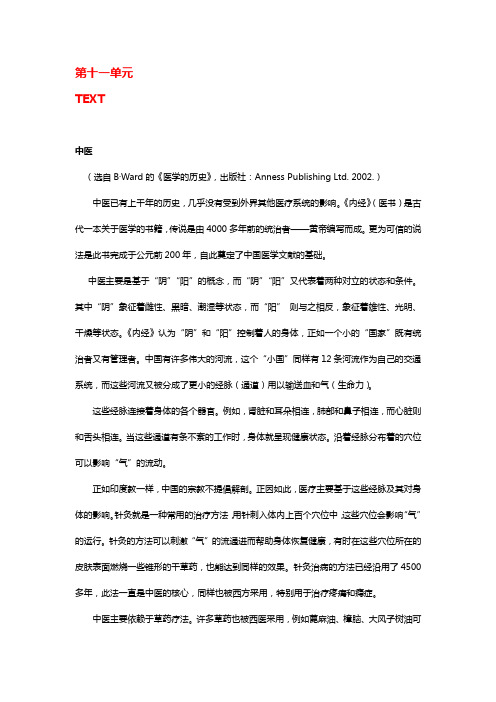
第十一单元TEXT中医(选自B·Ward的《医学的历史》,出版社:Anness Publishing Ltd. 2002.)中医已有上千年的历史,几乎没有受到外界其他医疗系统的影响。
《内经》(医书)是古代一本关于医学的书籍,传说是由4000多年前的统治者——黄帝编写而成。
更为可信的说法是此书完成于公元前200年,自此奠定了中国医学文献的基础。
中医主要是基于“阴”“阳”的概念,而“阴”“阳”又代表着两种对立的状态和条件。
其中“阴”象征着雌性、黑暗、潮湿等状态,而“阳”则与之相反,象征着雄性、光明、干燥等状态。
《内经》认为“阴”和“阳”控制着人的身体,正如一个小的“国家”既有统治者又有管理者。
中国有许多伟大的河流,这个“小国”同样有12条河流作为自己的交通系统,而这些河流又被分成了更小的经脉(通道)用以输送血和气(生命力)。
这些经脉连接着身体的各个器官。
例如,肾脏和耳朵相连,肺部和鼻子相连,而心脏则和舌头相连。
当这些通道有条不紊的工作时,身体就呈现健康状态。
沿着经脉分布着的穴位可以影响“气”的流动。
正如印度教一样,中国的宗教不提倡解剖。
正因如此,医疗主要基于这些经脉及其对身体的影响。
针灸就是一种常用的治疗方法,用针刺入体内上百个穴位中,这些穴位会影响“气”的运行。
针灸的方法可以刺激“气”的流通进而帮助身体恢复健康,有时在这些穴位所在的皮肤表面燃烧一些锥形的干草药,也能达到同样的效果。
针灸治病的方法已经沿用了4500多年,此法一直是中医的核心,同样也被西方采用,特别用于治疗疼痛和瘾症。
中医主要依赖于草药疗法。
许多草药也被西医采用,例如蓖麻油、樟脑、大风子树油可以用来治疗麻风病,铁可以治疗贫血。
众所周知,人参是中国的兴奋剂,用后可使人精力旺盛。
古代的中国人还发明了接种疫苗的方法用以治疗天花。
他们从天花中提取的少量脓汁注射到健康的人体内,使之产生轻微的疾病症状进而对深度感染形成免疫力。
欧洲直到公元1700年才发现了接种疫苗的方法。
Unit-11-On-Becoming-a-Better-Student课文翻译综合教程三
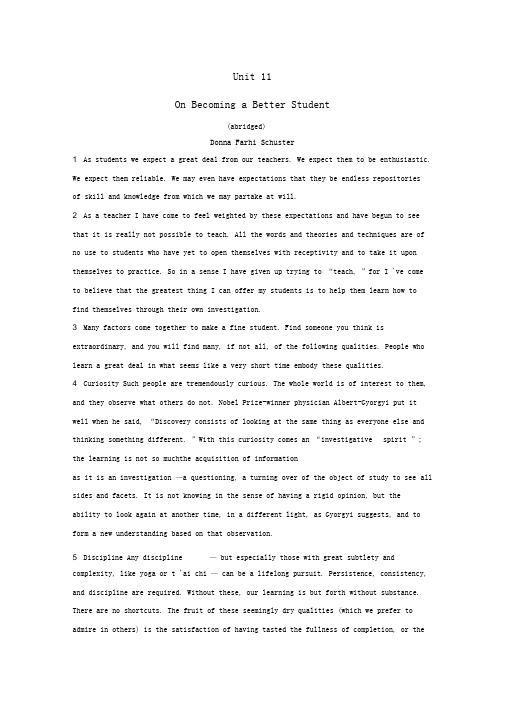
Unit 11On Becoming a Better Student(abridged)Donna Farhi Schuster1 As students we expect a great deal from our teachers. We expect them to be enthusiastic. We expect them reliable. We may even have expectations that they be endless repositoriesof skill and knowledge from which we may partake at will.2 As a teacher I have come to feel weighted by these expectations and have begun to see that it is really not possible to teach. All the words and theories and techniques are of no use to students who have yet to open themselves with receptivity and to take it upon themselves to practice. So in a sense I have given up trying to “teach, ”for I 've cometo believe that the greatest thing I can offer my students is to help them learn how tofind themselves through their own investigation.3 Many factors come together to make a fine student. Find someone you think is extraordinary, and you will find many, if not all, of the following qualities. People who learn a great deal in what seems like a very short time embody these qualities.4 Curiosity Such people are tremendously curious. The whole world is of interest to them, and they observe what others do not. Nobel Prize-winner physician Albert-Gyorgyi put it well when he said, “Discovery consists of looking at the same thing as everyone else and thinking something different. ”With this curiosity comes an “investigative spirit ”; the learning is not so muchthe acquisition of informationas it is an investigation —a questioning, a turning over of the object of study to see all sides and facets. It is not knowing in the sense of having a rigid opinion, but theability to look again at another time, in a different light, as Gyorgyi suggests, and to form a new understanding based on that observation.5 Discipline Any discipline —but especially those with great subtlety and complexity, like yoga or t 'ai chi —can be a lifelong pursuit. Persistence, consistency, and discipline are required. Without these, our learning is but forth without substance. There are no shortcuts. The fruit of these seemingly dry qualities (which we prefer to admire in others) is the satisfaction of having tasted the fullness of completion, or thethrill of meeting a difficult challenge with success. Perhaps, though, our culture is in need of redefining what it means to study. If we can look at our chosen discipline or craft as an ongoing process rather than as a discrete accomplishment, the potential for learning can be infinite. With this attitude we may find ourselves treating even the most mundane discovery with wide-eyed wonder and joy.6 Risk-Taking Whyis it, then, that so few people live up to their true potential? Beyond the well-paved roads and secure structures we usually build for ourselves lie demons, unsure footing —and unfelt pleasures. To be a student is to take risks. Yet most education discourages people from venturing far enough to take risks to make mistakes.“Children enter school as question marks and leave as periods, ”observes educator Neil Postman. What kind of punctuation mark do you represent? Do youfind yourself looking for tidy answers that give you a feeling of security? By learning to find the one right answer, we may have relinquished our ability to find other answers and solutions. We learn, then, not to put ourselves into situations where we might fail, because failure has tremendous social stigma. When we try different approaches and do things that have no precedence in our experience, we will surely make mistakes. A creative person uses these “failure ”as stepping stones.7 Initiative Can we begin, then, to see that our teachers are guides on our journey, but that the journey itself is our own responsibility? There is nothing quite sosatisfying as undergoing a difficult process and after long hard work discovering the true nature of that process. It could be as simple as throwing a perfect pot, or as complex as formulating a new theory of physics. The satisfaction we feel will be directlyproportional to amount of work we do by ourselves to achieve our goal. Successful students do not expect to be spoon-fed, but take their own initiative.Wanting answers from my teacher has often been a way for me to avoid taking the initiative to discover my own answers through my own practice.8 Enthusiasm To learn, then, is to open oneself. Jim Spira, director of the Institute for Educational Therapy in Berkeley, California, asks his students to prepare themselves to learn in this way: Drop your prior knowledge •…[and] attempt to grasp the new frameworkin its own context. The student complains, ‘But I know what is important. 'If what you know is important, then it should be there when youfinish the course. If you continually ‘hold onto it, 'then you 'llonly see what ispresented in terms of the old knowledge/framework and never really grow in new ways. ”9 Finally, as we each advance on our own unique journey, let us live each day as beginners. Being “advanced”has its own pitfalls —among them complacency and pushing or forcing. To go deeper may mean to be still, to progress more patiently, or to devote more time to other areas of our lives as yet green and immature. AsF.M. Alexander, of the Alexander technique, once said to his students as theystrained and labored, “Give up trying too hard, but never give up. ”10 TIPS FOR THE ASPIRING STUDENTThe information that follows is designed as a guide. The author welcomes correspondence from those who can add to it.Be attentive. Teachers will usually go out of their way to help a self-motivated and interested student.Be seen. If you want the teacher to know that you are serious, sit or stand in the front of the class. Make eye contact and introduce yourself, either before or after class.Be on time. Consistent lateness is a sign of disrespect. If you take your teacher 's skill so lightly, why should he or she take you seriously? Missing the beginning of class can also be physically dangerous if you have missed explanations and work meant to prepare you for more difficult movements. Be consistent. The quality of any class improves when there is a collective commitment to regular attendance. In this way you can gain a cumulative knowledge and progress at a more rapid pace. On a morepractical level, your attendance may be your teacher 's livelihood.Listen with your whole body. We have come to treat words like the background noise ofa radio. Plant words in the pertinent area of your body so that information can be“embodied ”.Appreciate constructive criticism. Rememberwhy you're there —to break throughrestrictive habit patterns and to change. Teachers usually reserve the most scathing criticism for their most promising students!Questions can help clarify and enrich both teacher and student if the student 'squestions are pertinent. If, on the contrary, the student is asking questions because he or she is late or inattentive, the student is being disrespectful to the teacher and fellow classmates and is consequently lowering the quality of the class. Highlypersonal questions with little relevance to the subject at hand are best asked after class.You have the right to disagree —but you do not always have the right to express it.Sometimes it is appropriate to challenge a teacher. It is unethical, however, toargue with a teacher or badger a teacher in public. If you thoroughly object to what is being taught, you are free to leave and learn elsewhere.Let your teacher know how much you appreciate him or her. Teachers need encouragement like everyone else. Giving them feedback when something has proved particularlybeneficial or injurious to you can help them improve the quality of their teaching.优秀学生是怎么炼成的(节选)唐娜法伊舒斯特1. 作为学生我们对老师期望甚高。
- 1、下载文档前请自行甄别文档内容的完整性,平台不提供额外的编辑、内容补充、找答案等附加服务。
- 2、"仅部分预览"的文档,不可在线预览部分如存在完整性等问题,可反馈申请退款(可完整预览的文档不适用该条件!)。
- 3、如文档侵犯您的权益,请联系客服反馈,我们会尽快为您处理(人工客服工作时间:9:00-18:30)。
Book 3-Unit 11
Extended Activities
Dictation Read More Grammar and Vocabulary Translation Raise Questions Writing Cultural Information
Read A Glimpse of the Future on page160, and discuss:
1. What do you plan for your future? 2. Can you feel the responsibilities this society places on you? What are they?
Book 3-Unit 11
F FΒιβλιοθήκη F T T6. Lisa thought highly of Jude the Obscure written by Thomas Hardy. 7. There seemed to be two purposes for the interview, one was to find out how students spent their non-school time, the other was to find out about their views of the meaning of life. 8. The three girls were all engrossed in the question about their future. 9. The girls thought that Edwin Shaw was oldfashioned and he asked silly questions. 10. It can be inferred from the interview that Edwin Shaw had some worries about the future of Britain.
Book 3-Unit 11
Vocabulary Work: Collocation
Look at the following table and tick the possible collocations of verbs and noun phrases.
reach an ambition a dream an agreement an obligation a target a compromise attain secure realize fulfill achieve
Book 3-Unit 11
Grammar: Post-modification Vocabulary: Collocations
Book 3-Unit 11
Post-modification
Study the following examples and see how they are expanded from a noun phrase. 1. His father placed him at the entrance of the two roads—one leading to a peaceful sunny place covered with flowers, fruits and resounding with soft sweet songs, the other … 2. The other two break into laughter as if she had said something clever.
Return to Menu Book 3-Unit 11
Today I met George in the supermarket for the first time after thirty years. We were close friends in primary school, but I dared not greet him because I was not sure whether he would recall our friendship after so many years. The thing that struck me was my own reaction to meeting him. From day to day I often see men who went to school with me and who have, in the common way of speaking, done well for themselves. They are now doctors, lawyers, important officials and even very successful businessmen. They are wealthy and famous figures in our city. Sometimes, they see me too and nod a greeting or turn their eyes to a shop window as the case may be. Whenever I encounter one of these people I always feel a burning shame and self-contempt, but George was different because we were special friends. I used to protect him from the bullies around our school. He noticed me and our eyes met, but he soon noticed the worn, old clothes I was wearing. He greeted me warm-heartedly from a distance and said quickly Script afterwards: "Billy, nice to see you, but I must run." I can't understand why I replied "Yes, Sir." Book 3-Unit 11
Book 3-Unit 11
Finish Exercise 3b, check your answers. 1. people present 2. present situation 3. a story much funnier than that 4. president elect 5. secretary-general 6. person responsible 7. responsible manner 8. city proper 9. nothing interesting
Book 3-Unit 11
Book 3-Unit 11
Key to Translation
(page 163)
1. There is a road on our left leading straight to the foot of the mountains. 2. In order to lose weight, she eats nothing but vegetables. 3. We are sorry to inform you that we cannot employ you right now. If there is a position vacant/a vacancy in the future, we will contact you.
a. Post modification by v. ed / v.ing b. Post-modification by adj.
Book 3-Unit 11
Post modification in set phrases/idiomatic usage e.g. the secretary-general (more dignified than The General Secretary); president-elect (not in office yet); the city proper (downtown area)
Book 3-Unit 11
confronting 5. There are a lot of problems that confront us at the moment. 6. I've just said the most stupid thingImaginable. that you can imagine. 7. Tagalog is one of the languages that spoken are spoken in the Philippines. 8. Most of the people who strolled in the park were strolling teenagers.
Book 3-Unit 11
Read the story and do the True/False/Not mentioned exercise on page 161. T 1. The author interviewed Lisa, Tina and Cheryl NM NM F T
because they were ordinary teenagers. 2. Teenagers in Britain were not allowed to go to pubs and discos. 3. While Lisa was quite tall, Tina and Cheryl are of medium height. 4. All three girls were hard-working students who liked to read books in their spare time. 5. The girls cherished privacy. They refused to answer the questions regarding boyfriends.
